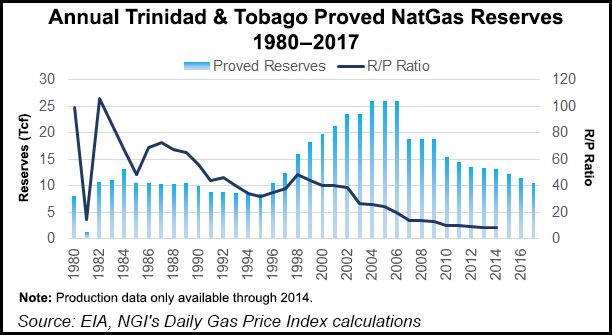BP Claims Two Natural Gas Discoveries Offshore Trinidad, Sanctions Offshore Project
Two “significant” natural gas discoveries have been made offshore Trinidad unlocking 2 Tcf of gas in place that will help to underpin more development, a unit of BP plc said Friday.

BP Trinidad & Tobago LLC (bpTT) claimed the gas discoveries with the 100%-owned Savannah and Macadamia exploration wells, which come less than two months after the unit ramped up a natural gas compression project onshore Trinidad, one of seven major upstream projects the supermajor expects to bring online in 2017.
“This is exciting news for both bpTT and the industry, as these discoveries are the start of a rejuvenated exploration program on the Trinidad shelf,” said bpTT Regional President Norman Christie. “We are starting to see the benefits of the significant investment we have made in seismic processing and Ocean Bottom Seismic acquisition. Savannah and Macadamia demonstrate that with the right technology we can continue to uncover the full potential of the Columbus Basin.”
Savannah was drilled into an untested fault block east of the Juniper field in water depths deeper than 500 feet, about 80 kilometers off the southeast coast of Trinidad. The well was drilled using a semi-submersible rig and penetrated hydrocarbon-bearing reservoirs in two main intervals with about 650 feet net pay.
Based on the success of the Savannah well, bpTT expects to develop these reservoirs via future tieback to the Juniper platform that is due to come online at mid-year.
The Macadamia well was drilled to test exploration and appraisal segments below an existing discovery that sits 10 kilometers south of the producing Cashima field. The well penetrated reservoirs in seven intervals with 600 feet net pay. Combined with the shallow SEQB gas reservoirs, the Macadamia discovery is expected to support a new platform post-2020.
“This is a testament to bpTT’s ongoing commitment to the development of our Trinidad and Tobago operations and the wider industry, and we look forward to the future portfolio drill-out,” Christie said.
Full start-up of the Trinidad onshore compression project is slated to take place over the next few months, eventually able to deliver up to 200 MMcf/d of gas. The improved capacity would allow bpTT to increase output from low-pressure wells in existing acreage in the Columbus Basin, using an additional inlet compressor for liquefied natural gas (LNG) at the Point Fortin Atlantic LNG facility.
BP, which has been working in the Republic of Trinidad and Tobago (T&T) since 1961, is considered the twin-island nation’s largest hydrocarbon producer, accounting for more than half of the country’s oil and gas production. The bpTT business, 70% owned by BP and 30% by Repsol SA, operates in 904,000 acres off Trinidad’s east coast with 14 offshore platforms and two onshore processing facilities.
In conjunction with the discoveries, bpTT also sanctioned the Angelin offshore gas project, which is to include the unit’s 15th platform about 60 kilometers off the southeast coast of Trinidad in water depths about 65 meters deep. The development is to include four wells and have a production capacity of 600 MMcf/d. Gas from Angelin would flow to the Serrette platform hub via a new 21 kilometer pipeline.
Drilling is set to begin in the second half of 2018 with first gas expected in early 2019.
Sanctioning Angelin was made possible because of a new gas sales contract with the National Gas Co., owned by T&T, Christie said.
“Successful completion of these negotiations was important not only to the sanction of Angelin but will also underpin a further $5-6 billion in potential future investments over the next five years. These investments are important to increasing indigenous national gas production and bringing more stability to gas supply to the downstream and Atlantic.”
Angelin originally was discovered by the El Diablo well in 1995 and appraised by the La Novia well in 2006.
BP’s news comes just days after Royal Dutch plc said it would expand its gas-rich holdings in T&T by paying $250 million for Chevron Corp.’s interests in the strategic twin-island Caribbean nation.
© 2024 Natural Gas Intelligence. All rights reserved.
ISSN © 1532-1231 | ISSN © 2577-9877 |
